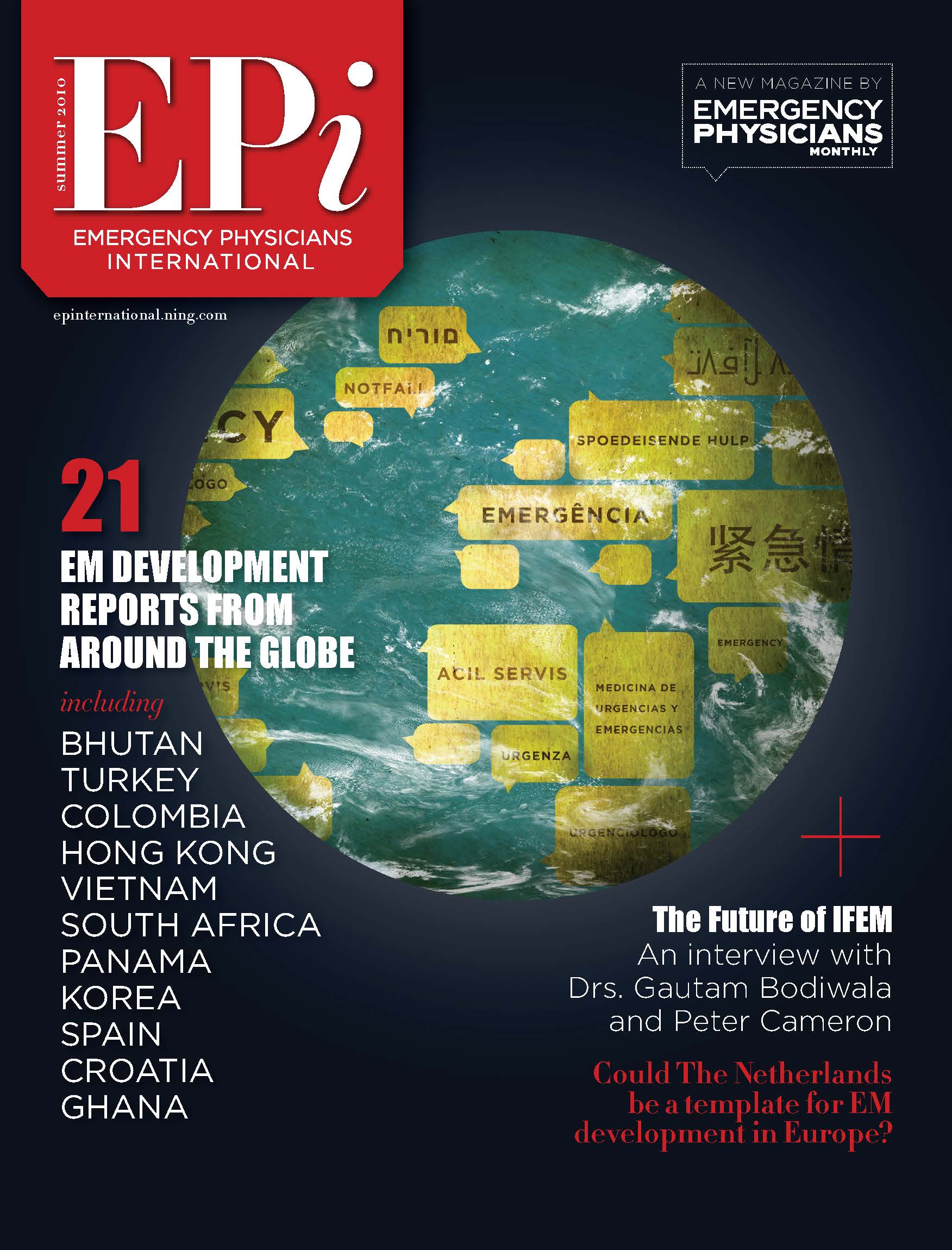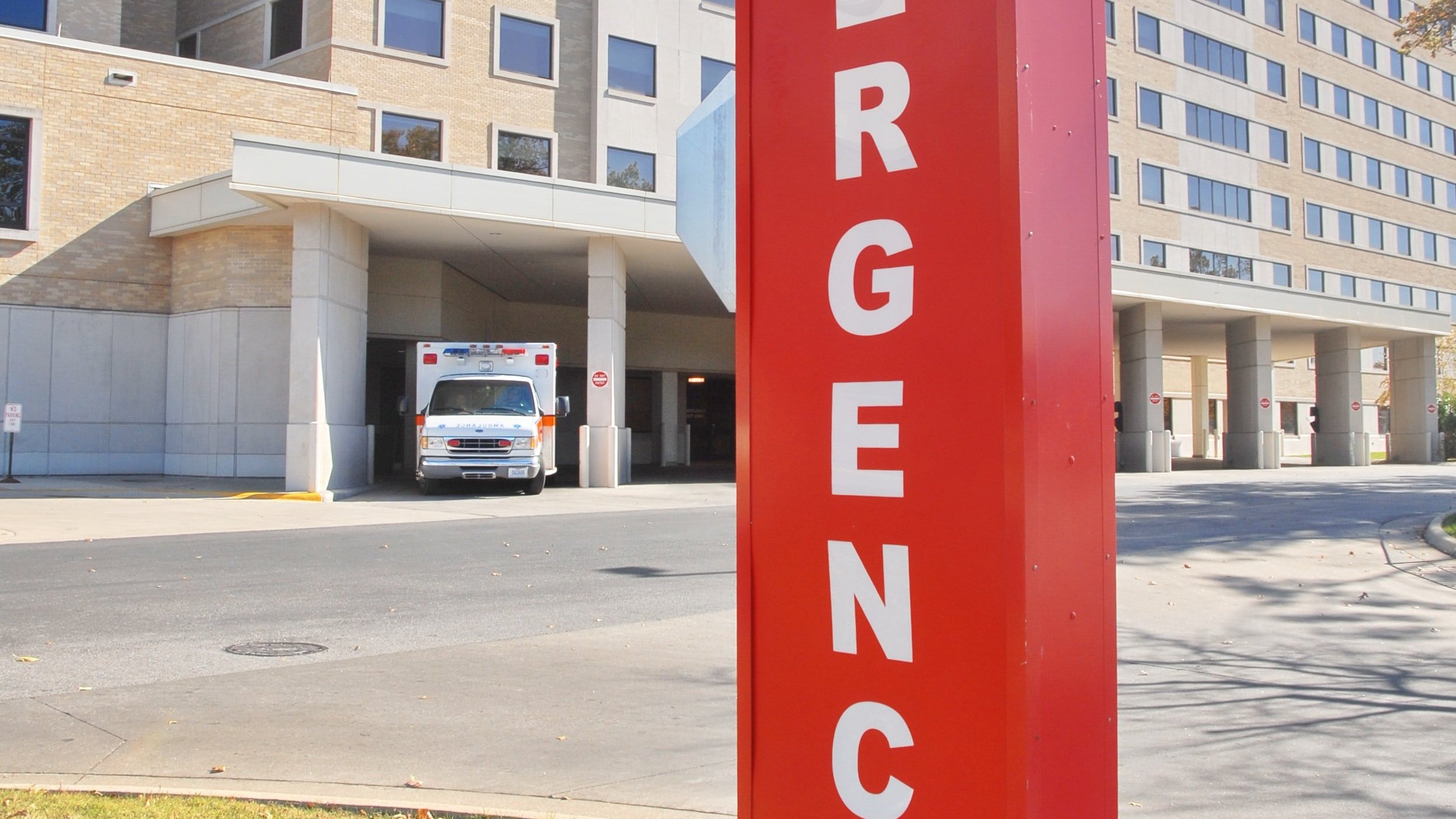Collegiality – A Tale Over the Telephone
I met Laurence over the phone on my first day as a consultant emergency physician.
I was in charge that day. My impostor syndrome was out of control and so was the department. I was cajoling a group of doctors and nurses I barely knew through the afternoon round when the ‘batphone’ rang. We gathered in resus to greet a woman who was struggling to breathe. I could totally relate.
A cannula went in and bloods were drawn. Her ECG was normal – phew! The resident collected her history while nurses set up the ventilator. I was running a blood gas when the phone in my pocket rang.
‘Hello’, I answered. ‘Admitting officer Dr Clare Skinner speaking.’
And there he was.
Laurence has a beautiful voice. Rich and resonant. Bass-baritone, with a cadence that suggests he would be at home on the stage – playing the Mikado, or perhaps the Pirate King.
‘Hello Dr Skinner’, he said. ‘I’m Dr Laurence David, a local GP. Do you have a moment to talk about a patient with me? I’d be grateful for your advice.’
‘Of course’, I replied. We discussed the patient and quickly agreed he should come to the emergency department for further care. I took down the details required to log the patient on the computer and we said our thank-yous. Sorted.
I had no inkling, then, of what would come.
‘Admitting officer’ is an old-fashioned term. It’s a quaint notion, harking back to simpler times, when a single doctor could realistically hold the keys to the entire hospital. These days, the system is so large, complex and busy that hospitals can feel more like a group of competing tribes than a kingdom. With the demise of outpatient clinics and the emergence of ‘bed-block’, the work of emergency departments has dramatically changed too.
I’ve heard of places where the admitting officer is called ‘lead clinician’, ‘floor consultant’ or ‘medical co-ordinator’. My favourite is ‘EPIC’ – which stands for emergency physician in-charge, and hints at the super-hero like levels of cognition, stamina and patience required to do the job well. Regardless of their official title, the person in the role must be an expert juggler.
The admitting officer’s number one priority is safe patient care. It’s complicated. Over the phone, I am accountable for advice I give to clinicians I don’t know, about patients I have never met, in settings near and far. I require in-depth knowledge of the health system to understand which services are available across inpatient, outpatient and community settings, as well as knowing options to move patients around. I have to balance the needs of individual patients against the resources available in the emergency department. In most hospitals the admitting officer is also expected to supervise junior doctors and carry their own clinical load. It’s like spinning plates.
The phone rings constantly; calls from GPs, other medical specialists and doctors-in-training referring patients for review or admission. Notification of urgent test results. Hospital executives monitoring patient flow. Carers checking in on their loved ones, not-so-urgent test results, and a fair share of wrong numbers too. The signal-to-noise ratio is extreme. The phone reliably rings at the precise moment I need to pee.
It wasn’t long until I heard from Laurence again. After several phone consultations we became good friends.
He’s a skilled communicator who understands that clinical conversations require two-way empathy and nuance. He can sense when I’m up for a natter – sharing stories from his grandson’s Bar Mitzvah and hearing about my daughter being elected class captain – or when I’m under the pump and a straight-up clinical handover is what’s required. I suspect Laurence’s generation was never taught ‘ISBAR’ (introduction, situation, background, assessment, recommendation) – but he has it down to a fine art.
Laurence is unfailingly professional and polite. He treats me as a valued colleague whose opinions and recommendations he trusts and respects. Sadly, this is rarer than you might think. A call from Laurence is always a pleasure. The large box of chocolates he sends to the emergency department at Christmas time always goes down well too.
It’s good for us all to stop and reflect, occasionally, on how we can work better with our colleagues. After all, health care is a team sport.
My interactions with Laurence demonstrate a few simple things that all doctors could do to help the admitting officer have a good shift.
It’s basic, but good phone etiquette is important. Introduce yourself with your full name and position. Confirm you are speaking with the right person and that they are free to talk. Speak clearly, be ready to spell out complicated words and check that critical information has been understood. Say please and thank you. Some doctors (like me) enjoy a bit of banter, others want to get down to business. There’s no right or wrong, we all have to keep our social antennae up to figure that out on a case-by-case basis. And while we’re on the topic, please always answer your work phone with your full name and position too.
Be prepared. Have the patient’s details close to hand – name, age, birthdate and gender are likely to be requested. If the patient has a medical record number that will come in handy too – if you can find it easily. Take a moment to think through and mentally organise the patient’s story. Emergency physicians are not known for their patience, so the short version is fine. I’m most interested in the patient’s acute problem and significant chronic problems, just issues likely to affect immediate clinical decisions. I promise I won’t put you through a long case exam. It’s also useful to know the names of any specialists who are already involved so my team know who to contact if they need senior clinical advice in a hurry.
Think about transport. Where is the patient now and how will they get to hospital? What time will they arrive? Are they okay in a taxi, would an ambulance be appropriate, or should the retrieval service get involved? In the bustle of organising a transfer, simple treatment can be easily overlooked – pain relief, wound care, salbutamol for a wheezy child. When the admitting officer accepts a patient, they are responsible for making sure they arrive in the emergency department safe and sound. I promise I’m not trying to be difficult when I want to talk these steps through with you. We both want the patient here in the best possible condition.
And please, if you are an inpatient team specialist or trainee who accepts a patient for admission, think carefully about the plan. What’s going to happen when the patient arrives in the emergency department? Who needs to know? Who needs to be there? What needs to be done? Document the plan and hand it over to your own team, as well as to me. Things run more smoothly that way. If the patient needs an urgent procedure, please try to arrange it in advance.
Don’t accept patients who require specialist services that are not available on our campus – that gets really awkward. And, please, don’t give me your busywork to do. We have the same goal, safe and effective patient care, and if asked politely I’m always willing to help – but I’m not your intern.
Years passed. Townhouses and apartments sprouted around the hospital. The department got busier. Interns became specialists. Laurence joined a new practice. I became director.
One day, my relationship with Laurence suddenly changed.
I’d answered the phone the usual way. ‘Admitting officer speaking.’
‘Clare’, he began.
Laurence always used my title. I instantly knew something was horribly wrong.
‘I need some advice about me’, he said. His speech was slurred. ‘My face feels strange and I can’t move my arm. I’m fully booked for the day. I’ve got patients waiting. I don’t know what to do.’
‘Call an ambulance’, I instructed him. ‘You need to come to hospital. Now.’
The nurse touched my arm. ‘Your VIP is in bed 2. He’d like to see you.’
And there he was.
The man on the trolley bore no resemblance to the one in my imagination. He was shorter and slighter than his voice suggested, with shiny eyes and a broad, open face. He reminded me of the Wizard of Oz.
The left side of his body was not moving.
I performed a neurological examination, ordered bloods and a CT, then paged the stroke registrar.
‘I’m so glad you’re here’, he said. ‘I’m scared.’ He began to weep, so I joined in. I sat with him, holding his hand. Until he was whisked away, with lights and sirens, for clot retrieval.
I missed my friend Laurence. I looked forward to his calls. His civility, warmth and genuine willingness to collaborate provided me with a small dose of humanity. A few minutes of time-out, now and then, from the drama and chaos of my workplace.
I didn’t hear from him for months. I was worried.
Then one afternoon, driving to work, I heard a familiar voice on the ABC – stridently defending the flu vaccine on talkback radio. ‘Yes!’, I cheered. ‘He’s back.’
Laurence called a few days later. It was Christmas Eve.
‘Hello Clare’, he said, with a smile in his voice. ‘I’ve got a little something for you. And by pure coincidence, I’ve got a patient I suspect is having a stroke. Shall I send her up?’
But the stroke service had evolved into a network. Ambulances now delivered stroke patients to the tertiary hospital down the road. From a quality and safety perspective, it made perfect sense, but it took a while for hospital insiders to learn the new processes, let alone our local GPs.
That’s another thing the admitting officer can help with. The hospital landscape shifts constantly, and we stay up to date with which patients with which problems go where. The rules are complicated. In my system, orthopaedic surgeons operate on all ages. General surgeons don’t, so children with appendicitis are usually transferred to the kids’ hospital. Give me a ring and I can help get your patient to the right place first time.
From the perspective of a GP – outside the hospital system – I imagine that working out whether to call the admitting officer must be tricky. Interrupting a busy person unnecessarily never feels good. I also acknowledge that my emergency physician colleagues, while usually well motivated, will occasionally give callers short shrift.
In my experience, handover from a GP is always useful when the patient is complex or unstable – your in-depth, longitudinal knowledge of the patient will give us an important head start. Handover is also useful when the management plan is not clear, because we can work it out together. It’s not so necessary to call about patients with simple problems unless you need help navigating the system – in which case, please get in touch.
On the other hand, if you are a member of a hospital team accepting a patient for admission or review via the emergency department, we need to hear from you every single time. Please.
Laurence turned up at reception that afternoon.
He handed me a small white box, tied with red ribbon. ‘I chose it just for you’, he said, and gave me an enormous hug. Inside was a chunky multi-tool knife, with my name engraved, in italics, on the lock blade.
Laurence was animated and proud. ‘It will cut through anything’, he declared. He’d bought it online – the exact tool used by the South African rescue service. ‘It will be handy if you attend a road accident. Or if you get car-jacked.’ Laurence had been given one as a trainee in Johannesburg, many years ago. ‘I seriously hope I’m never going to need it driving around the northern suburbs of Sydney’, I chuckled. ‘I suppose not’, he said, then laughed. He hugged me again, and I noticed that both his arms squeezed me tight.
It’s one of the most special presents I have ever received – from a patient or colleague. Even though I am much too scared to use it.
Laurence still rings the admitting officer – sometimes for admissions, sometimes for a second opinion. Sometimes he rings me in the office just for a chat. I love that he is honest about what he needs from me and the emergency department. He must be getting close to retirement, but I’m not going to bring it up. These days we’re always on first name terms. I get my own box of chocolates for Christmas.
And how about you, my colleague? As admitting officer, I’m here, on the end of the phone, to help you too. It’s so much easier when we’re nice to each other, and it’s better for our patients as well.
Let’s make a deal. We’ll work together. We’ll be polite, professional and well prepared. We’ll respect each other’s skills and be mindful of our contexts. And we’ll be forgiving when things don’t go perfectly. Civility saves lives.
Who knows? One day, we might become friends.
This article originally appeared in Life in the Fast Lane. Published with permission by the author.






